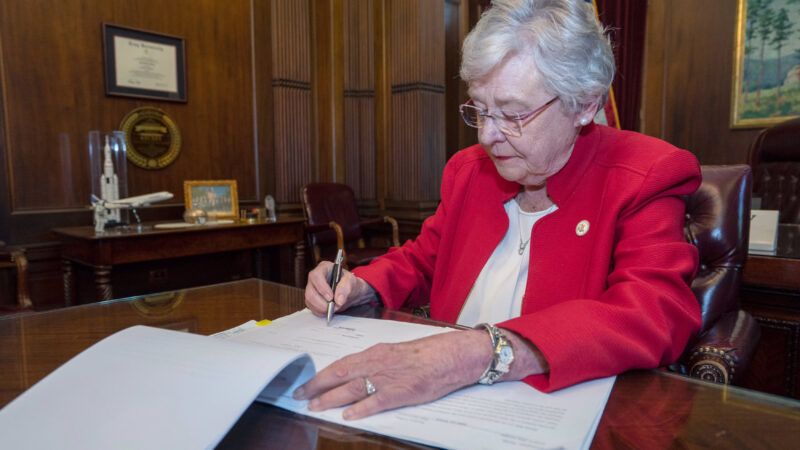Alabama's Governor Calls for a Moratorium on Executions in the State
While the pause comes as a relief to those opposed to the death penalty, Ivey's full-throated defense of the practice makes it clear that she seeks only a temporary pause in executions, not an end to the policy.

On Monday, Alabama Governor Kay Ivey (R) announced that she was seeking a moratorium on executions in the state, following the third botched lethal injection execution in recent months. While Ivey is still a stringent supporter of the state's death penalty, this pause in executions will likely continue until an internal investigation into the state's practices is concluded.
In a press release sent Monday, Ivey wrote that she had requested that Alabama Attorney General Steve Marshall withdraw pending motions attempting to schedule the execution dates of two inmates, as well as requested that he refrain from scheduling additional executions until the state's Department of Corrections can conduct a "top-to-bottom review of the state's execution process."
Over the past several months, Alabama has faced an unusually high number of unsuccessful attempts at lethal injection executions. The state has attempted to execute three men, each with considerable difficulty locating the inmate's veins. While the state did successfully execute Joe Nathan James in July, they did so only after a three-hour delay. While the state remains tight-lipped on what exactly happened, an investigation published in The Atlantic argued that the state likely spent hours jabbing James with needles, possibly resorting to physically cutting his arm open in an attempt to find a vein. Following James' death, two more men—Kenneth Eugene Smith and Alan Eugene Miller—had their executions halted after prison officials were unable to successfully place a line for the lethal injection.
These attempted executions have brought increased scrutiny to the state's prison system, apparently motivating Ivey to call for the moratorium. However, anti-death penalty advocates should not mistake Ivey's pause on executions to mean she no longer approves of the practice.
"For the sake of the victims and their families, we've got to get this right," Ivey wrote in Monday's press release. "I don't buy for a second the narrative being pushed by activists that these issues are the fault of the folks at Corrections or anyone in law enforcement, for that matter. I believe that legal tactics and criminals hijacking the system are at play here."
In her statement, Ivey further emphasizes that the review of execution practices will be to make Alabama better at killing death row inmates—seemingly to help victims' families—writing "I simply cannot, in good conscience, bring another victim's family to Holman [Correctional Facility] looking for justice and closure, until I am confident that we can carry out the legal sentence."
However, Ivey forgets that crime victims' families are not universally in favor of the death penalty. In fact, the family of Joe Nathan James' victim were in fact deeply opposed to his execution and called on the state to spare him. Like other politicians favoring the death penalty, Ivey relies on concern for victims' families only when they agree with the state's goal: killing death row inmates. When they disagree with the government's desires, they seem to not exist.
While Alabama's moratorium on executions comes as a welcome reprieve for those opposed to the death penalty—Ivey's continued support for the practice makes it clear that she seeks only a temporary pause in executions, not an end to the policy.
